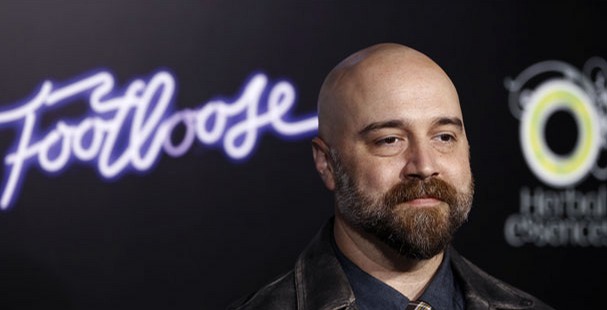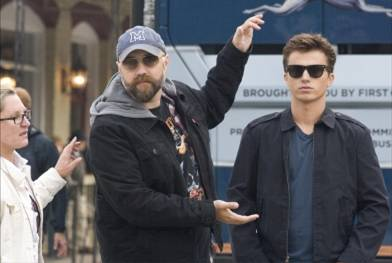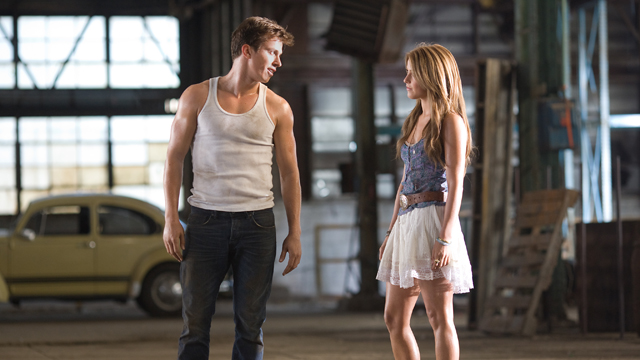
Craig Brewer was the biggest fan of the original “Footloose” from 1984. He wants you to know that. When you listen to him talk about filming the remake, you get the idea that he was born to make it. Somehow, it relevantly fits into the canon of his other movies as well. He makes movies about the South. Look at “Hustle and Flow” (2005) and “Black Snake Moan” (2006). Southern flavored movies are a trademark that he should stick to. I tend to think it’s a good idea that he isn’t thinking yet of making movies in the big city.
Paramount Pictures had different re-imaginings for the remake. It almost took place in the big city, i.e., New York. It almost was made by Kenny Ortega. It almost starred Zac Efron. The one thing Brewer doesn’t talk about in this article is Zac Efron. He comes on very exuberantly when he supplies answers as to casting his remake, but kind of like he wanted to ride roughshod over Efron’s name intentionally. Read between the lines and see that he would have never, ever would have gotten involved had Efron been cast by the studio. In this interview, Brewer’s mind seems firm on every filmmaking issue.
Reporting from Los Angeles.
When you first saw “Footloose,” what was it that grabbed you?
Brewer: Up until that time, my idea of a hero was very different. My heroes had lightsabers and bullwhips and were running after lost arks. But, when I looked at myself, at 13, I came from an athletic family. My granddad was this famous ballplayer, named Marvin Throneberry, who played for the Yankees and the Mets, so everybody assumed that I was going to be athletic, but I was anything but. I was chubby and awkward, and the only way I could really meet girls was to join children’s theater, so that’s what I did. I can track my experience with different characters I’ve played in “A Christmas Carol.” I got my first kiss from Bob Cratchit’s daughter. Later, I got my first french kiss when I was a Fezziwig partygoer. It just went up the line there.
But, when I saw “Footloose,” I was 13, and that’s a very magical time for any movie-goer. It’s the first time that you really claim a movie. It was like, “That is my movie!” When I saw Kevin Bacon in that skinny tie with the big hair, and he was defiantly walking through that small town high school, I felt something very familiar…When I saw “Footloose,” I saw that on the screen. It wasn’t just the music and the dancing. It was the whole story and the attitude. It was just different from any movie I had seen, up until that point. To be honest, that’s what ultimately made me decide to remake it.
How did you end up co-writing this with the original screenwriter, Dean Pitchford?
Brewer: I didn’t want to diminish him. I’m very proud of that. I asked to have the original script sent to me. I told Paramount that I wouldn’t do “Footloose” unless I was able to be given permission to essentially do the original “Footloose.”
See, there was another “Footloose”that Paramount was down the road with. They were doing a version with Kenny Ortega, that was to be more of a dance celebration, and it just wasn’t something that I was interested in. When they parted ways with Kenny, they came to me twice and I kept passing. I was like, “No,‘Footloose’can’t be remade. It’s a classic. I can’t really do it.” And then, they said to me, “Well, when was the last teenager movie you saw that really had those ideals and morals and energy that ‘Footloose’gave you, when you were 13?” And, the more I thought about it, I really couldn’t think of any.
So, I asked them, “Can I do‘Footloose?’” And they were like, “That’s what we’re asking you to do!”
I said, “No, can I really do ‘Footloose?’ Can I take the original script?”
They were like, “Well, we would want you to update it.”
I said, “Yeah, but let’s say I chose not to do that. Could I do that ‘Footloose?’”
They were like, “Well, why are you asking if we would have a problem with that?”
I said, “Okay, you’re fine with me doing a movie for 13-year-olds, that has kids smoking pot, that has kids drinking, that has Ariel pulling up her pants having just had premarital sex with a boy two or three years older than her? You’re fine with me doing a scene where Ariel’s boyfriend beats her until her mouth bleeds? Are you sure you’re cool with this?”
They were like, “What are you talking about?”
I said, “It’s in ‘Footloose!’”
All of those things are in “Footloose,” and I think everybody has forgotten about that because they just remember “Footloose”from these VH-1 “Remember the ‘80s” specials. They think that it’s just all bubblegum and pop. I just wanted to make sure that they wanted to make this movie, and they did… I got the original script and I read through scenes that had been cut out of the original movie, and I went through and made my own version, changing the structure a little bit and rewriting scenes, and keeping some scenes verbatim. So, it went through an arbitration process and the Writer’s Guild decided that we would share screenplay credit, which I was incredibly proud to do. Dean read my script, before I started shooting it. I didn’t want to make the movie unless I got Dean, not only to sign off on it, but support it. He’s been a great friend and a wonderful collaborator with me.
With three movies set in the South, do you want to ever go to the big city?
Brewer: I think that “Footloose”really worked in the South. When I first saw it, when I was 13, I assumed it was the South. I didn’t know the difference between the Midwest and the South. The only thing that I knew, that tipped me off that it wasn’t the South in 1984, was that there was not one face of color in that movie – not in the background, nothing. That was one of the first things where I said, “That will be the one thing I change in my movie. I’d like it to be a little more indicative of the South that I know.”
What was it about Kenny Wormald and Julianne Hough that led you to cast them as your leads?
Brewer: There were a couple other actors attached to the earlier versions, but I wouldn’t take on the project unless I could have complete creative control in casting, and that meant completely shaking the Etch-a-Sketch and saying, “If I want to cast an unknown, then I’m able to cast an unknown.” Luckily, the studio was really behind that idea. When I think back on my experience watching “Footloose”the first time, when I was 13, I did not know who Kevin Bacon was, or Sarah Jessica Parker, or Chris Penn. There’s something really special for a young person to sit in an audience and discover somebody.
In the case of finding our Ren, we looked everywhere – Australia, London, all over America – but it had to have some stipulations. Obviously, he needed to be able to somewhat dance, he needed to be able to act, and he needed to be an unknown.
We were down to the wire in casting our lead, and it was between Kenny and one other person. I was watching Kenny do the scene with Miles Teller, who plays Willard, and I called, “Cut!,” and they just started joking with each other. I said, “Why is it that when I call cut, I see Ren McCormack, but when I call action, something goes away?” I realized what it was, was that Kenny was hiding his Boston accent. You live your life trying to get rid of a thick accent because it limits you as a performer. I told Kenny, “I want you to befrom Boston. I’m going to have this movie really be about North and South. I want you to be you, under this set of circumstances.” And he did great.
Julianne was attached to the version of “Footloose”that Kenny Ortega was doing. It was my guess that Julianne was hired because she could dance and she looked great. I didn’t think they were necessarily wanting to hire her for her acting because I hadn’t seen her act in anything. I told the studio that I didn’t want to just assume that Julianne would be Ariel. They were like, “Well, would you meet with her?” She lives in Tennessee and I live in Tennessee, so I drove from Memphis over to Nashville and had lunch with her. She was not only delightful, but she was downright passionate. She was telling me that, because of having to go abroad so early, for her career in dance and the arts, she wanted to grow up faster than she was ready for, and I had an understanding of that. That’s something that happens, when you’re in theater. So, that day, we went over to my casting director’s house and I worked her to death. We read every scene, and she had tears and was just fighting for the role. She did such a great job, and I’m very happy that I got her.
Why did you end up making the changes that you decided to make?
Brewer: The one thing that I never really liked in the first movie was the mother character. I know that’s a little bit sacrilege because I’m a big fan of “Footloose,”but I always felt that Ren should have a greater obstacle to overcome, in terms of his own experience. And, the idea that he watched his mother go through this really painful and horrible death with leukemia, at the end of the movie, when he’s facing Reverend Moore, it’s a child who’s lost a parent coming to terms with a parent who’s lost a child. That is something I would much rather see explored than to see again a guy who is basically upset with a dead-beat dad.
Did you intentionally hold the “angry dance” sequence until the end of the shoot, in case there were injuries?
Brewer: Busted! Yeah. It was a three-day shoot. Everything else we pretty much did in a day. I remember us saying, “We are moving the angry dance to the end of the shoot because what if we kill the kid? We need to have a movie in the can!” I’m joking about that, but, there was this moment when Kenny was in this harness, hanging from a chain, and we were about to have him do that big scene where he’s flying on the chain, and I was like, “This is why we put this off to the end. If you fall and die, we can just paste it together!”






